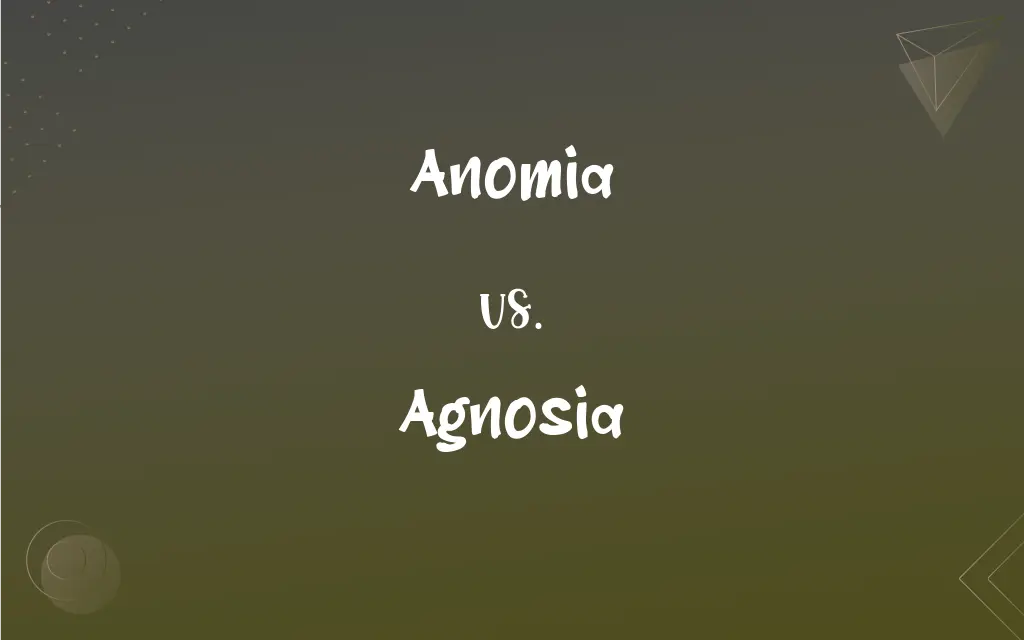Anomia vs. Agnosia: What's the Difference?
By Harlon Moss & Janet White || Updated on May 29, 2024
Anomia is the inability to name objects or recall words, while agnosia is the inability to recognize objects, people, sounds, or smells. Both are cognitive impairments but differ in their specific deficits.

Key Differences
Anomia is a language disorder characterized by difficulty in recalling words or names, often due to brain injury or neurological conditions like stroke or Alzheimer's disease. People with anomia know the object but cannot retrieve its name, leading to frustration and communication challenges. Agnosia, on the other hand, is a broader neurological condition where the individual cannot recognize objects, people, sounds, or smells despite having no primary sensory deficits. This impairment arises from damage to the brain areas responsible for processing sensory information, affecting the person's ability to identify familiar stimuli.
While anomia specifically affects word retrieval, agnosia impacts the recognition process. For instance, a person with anomia might see a pen but be unable to name it, whereas someone with agnosia might see the pen but not recognize what it is or what it's used for.
Anomia is often associated with damage to the left hemisphere of the brain, particularly the language-dominant areas like the temporal and frontal lobes. On the other hand, agnosia can result from damage to various brain regions, depending on the type of agnosia—visual, auditory, or tactile.
Both conditions can significantly impact daily life and communication, but their management and treatment strategies differ. Anomia might be addressed through speech therapy focusing on word retrieval techniques, whereas agnosia treatment might involve sensory re-education and compensatory strategies to improve recognition.
Comparison Chart
Primary Deficit
Inability to recall words or names
Inability to recognize objects, people, etc.
ADVERTISEMENT
Affected Area
Language retrieval
Sensory recognition
Brain Regions Involved
Temporal and frontal lobes
Various sensory processing areas
Associated Conditions
Stroke, Alzheimer's disease
Brain injury, neurological disorders
Treatment Focus
Speech therapy, word retrieval
Sensory re-education, compensatory strategies
Anomia and Agnosia Definitions
Anomia
Difficulty in retrieving specific words during speech.
He struggled with anomia, often pausing to find the right words.
ADVERTISEMENT
Agnosia
Difficulty identifying sounds despite normal hearing.
Auditory agnosia made her unable to recognize her favorite song.
Anomia
A language impairment affecting naming abilities.
Anomia made conversations challenging for him.
Agnosia
Inability to recognize smells despite normal olfaction.
Olfactory agnosia made familiar scents unrecognizable.
Anomia
Impaired ability to name common items.
Anomia prevented her from naming everyday objects.
Agnosia
Inability to recognize familiar objects.
He couldn't recognize his own face in the mirror due to agnosia.
Anomia
Word-finding difficulty due to brain injury.
After the stroke, he experienced severe anomia.
Agnosia
Impaired recognition of people or faces.
Prosopagnosia, a type of agnosia, left him unable to identify his friends.
Anomia
Inability to recall the names of objects.
Despite seeing the object, she couldn't recall the word phone.
Agnosia
Sensory recognition impairment without sensory loss.
Visual agnosia caused him to see but not identify objects.
Anomia
Aphasia characterized by the impaired ability to recall the names of persons and things.
Agnosia
Loss of the ability to interpret sensory stimuli, usually leading to the inability to identify or recognize objects using one or more senses.
Anomia
(neurology) The inability to remember names.
Agnosia
(neurology) The inability to recognize objects by use of the senses.
Anomia
(neurology) The difficulty in finding the right word.
Agnosia
Inability to recognize objects by use of the senses
Anomia
A genus of bivalve shells, allied to the oyster, so called from their unequal valves, of which the lower is perforated for attachment.
Anomia
Inability to name objects or to recognize written or spoken names of objects
Anomia
Type genus of the family Anomiidae: saddle oysters
FAQs
What causes agnosia?
Agnosia is caused by damage to brain areas responsible for sensory processing.
Is anomia related to memory loss?
Anomia specifically affects word retrieval, not general memory.
What are common treatments for anomia?
Speech therapy focusing on word retrieval techniques is common.
What is visual agnosia?
Visual agnosia is the inability to recognize objects by sight.
How does anomia affect communication?
Anomia makes it difficult to find the right words, hindering effective communication.
Can agnosia affect multiple senses?
Yes, agnosia can affect visual, auditory, and olfactory recognition.
What is anomia?
Anomia is the inability to recall words or names, often due to brain injury.
Is anomia a symptom of Alzheimer's disease?
Yes, anomia is often seen in Alzheimer's disease due to brain degeneration.
Can anomia be temporary?
Yes, anomia can be temporary, especially if caused by a transient brain injury.
Can agnosia occur without sensory loss?
Yes, agnosia occurs despite normal sensory function, impacting recognition.
What is prosopagnosia?
Prosopagnosia, a type of agnosia, is the inability to recognize faces.
Can agnosia be treated?
Treatment focuses on sensory re-education and compensatory strategies.
How does auditory agnosia manifest?
Auditory agnosia involves difficulty recognizing sounds despite normal hearing.
Can agnosia affect taste recognition?
Yes, gustatory agnosia affects the ability to recognize tastes.
How is anomia diagnosed?
Anomia is diagnosed through language and cognitive assessments by a specialist.
How does agnosia impact daily life?
Agnosia affects recognition, making daily activities and interactions challenging.
What is tactile agnosia?
Tactile agnosia is the inability to recognize objects by touch.
What part of the brain is affected in anomia?
Anomia often involves damage to the temporal and frontal lobes.
Can anomia improve over time?
With appropriate therapy, individuals with anomia can improve their word-finding abilities.
Is anomia the same as aphasia?
Anomia is a type of aphasia specifically affecting word retrieval.
About Author
Written by
Harlon MossHarlon is a seasoned quality moderator and accomplished content writer for Difference Wiki. An alumnus of the prestigious University of California, he earned his degree in Computer Science. Leveraging his academic background, Harlon brings a meticulous and informed perspective to his work, ensuring content accuracy and excellence.
Co-written by
Janet WhiteJanet White has been an esteemed writer and blogger for Difference Wiki. Holding a Master's degree in Science and Medical Journalism from the prestigious Boston University, she has consistently demonstrated her expertise and passion for her field. When she's not immersed in her work, Janet relishes her time exercising, delving into a good book, and cherishing moments with friends and family.































































